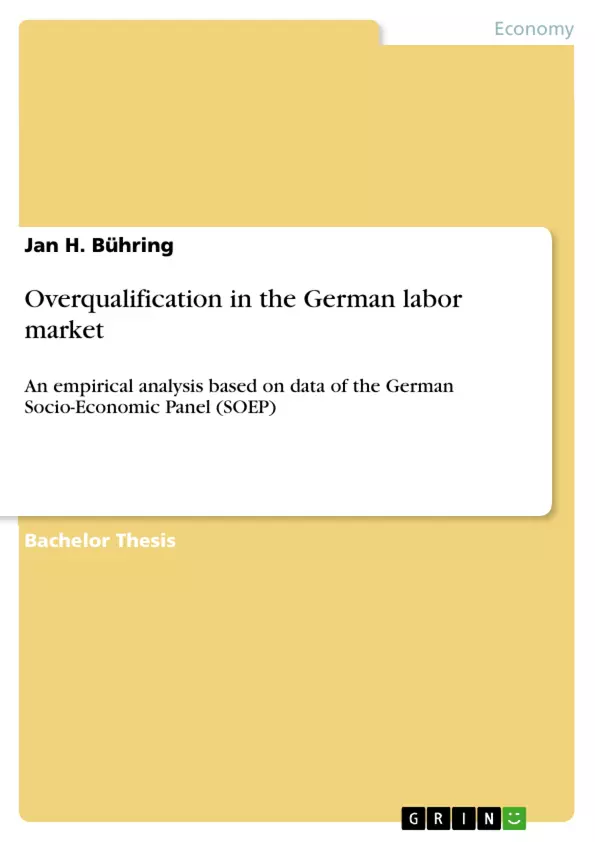A strange course description of an adult education center created rumblings in the press last year. The title of the new announced course was: De-qualification for academics; accompanied by the explanation that an academic degree or even a doctorate can be a big hurdle for employment in certain jobs like construction helper. But there would be no reason to despair, since the necessary target group specific vocabulary, adequat clothing, and specifically attitude changes can be learned. Despite of these clichés and a scheduled starting date of 1st April, the most funny but also characteristic thing was that several journalists fell for this April fool. The subjective perception of higher education has obviously changed in parts (Karschnick 2012). In former times, people used to say that you have to study to be successful in your job. Is overqualification for university graduates in Germany really existing and increasingly becoming a problem? However, this question can also be seen in another way. Directly related to this aggregated perspective is the decision making of an individual. If there are many university graduates working in an occupation, which does not require their education, it is obviously not very desirable. Is it worth to study and striving for an university degree?
Inhaltsverzeichnis (Table of Contents)
- 1. Introduction
- 2. Starting Point.
- 2.1 Economic Context and Classification.
- 2.1.1 Supply Side.
- 2.1.2 Demand Side.
- 2.1.3 Equilibrium ..
- 2.2 Methodology and Literature Overview.
- 2.2.1 Measuring Overeducation.....
- 2.2.2 Overeducation Perspective
- 2.2.3 Upgrading View
- 2.3 General Findings.
- 2.3.1 Overeducation Perspective
- 2.3.2 Upgrading View
- 2.4 Relation to Labor Market Theories.
- 3. Background in and Findings for Germany.
- 3.1 Annotations to German Labor Market and Educational System.
- 3.2 Available Findings for Germany in Literature…...........
- 4. Own Investigations ......
- 4.1 Data Set and Sample Restriction.....
- 4.2 Analysis from Overeducation Perspective.....
- 4.2.1 Method 1 after Gottschalk und Hansen: Description and Implementation
- 4.2.2 Method 1 after Gottschalk und Hansen: Placement and Annotations
- 4.2.3 Method 2 on the basis of Worker Self-Assessment (WA).
- 4.2.4 Method 2 on the basis of Worker Self-Assessment (WA): Placement and Annotations.......
- 4.3 Analysis from Upgrading View.
- 4.3.1 Upgrading View on Method 1 after Gottschalk und Hansen
- 4.3.2 Upgrading View on Method 2 on the basis of Worker Self-Assessment (WA)........
- 5. Combining and Interpretation of Findings
Zielsetzung und Themenschwerpunkte (Objectives and Key Themes)
The main objective of this thesis is to provide a well-founded empirical analysis of overqualification in the German labor market, grounded in economic theory. The author explores the phenomenon of overqualification and its potential negative implications for individuals and the labor market as a whole.- Examining the economic context and classification of overeducation
- Exploring different methodologies and their application in overeducation research
- Analyzing the implications of overqualification in the German labor market
- Investigating the perspectives of overeducation and upgrading on the labor market
- Combining and interpreting findings from various analytical methods
Zusammenfassung der Kapitel (Chapter Summaries)
Chapter 2 serves as the starting point for the analysis, introducing the concept of overeducation from an economic perspective. It discusses the role of education in the labor market, explores the implications of labor market heterogeneity, and outlines the various methodologies employed to study overeducation. Chapter 3 focuses on the German labor market and educational system, providing context for the analysis. It delves into the specific challenges and trends related to overqualification in Germany, referencing relevant existing research. Chapter 4 delves into the empirical analysis, employing different methods to assess overeducation. This chapter examines the data set and sample restrictions, providing a detailed analysis from both the overeducation and upgrading perspectives. Chapter 5 combines the findings from the different analytical methods used in Chapter 4, offering an interpretation of the results in relation to the broader context of overeducation in the German labor market.Schlüsselwörter (Keywords)
This work examines the phenomenon of overqualification in the German labor market, focusing on economic theory, empirical analysis, and the methodologies used to measure overeducation. The analysis utilizes data from the German Socio-Economic Panel (SOEP) to explore the implications of overqualification on the labor market, taking into account both the overeducation and upgrading perspectives. Key topics include educational mismatch, labor market heterogeneity, labor market theories, and the relationship between education and employment in Germany.Frequently Asked Questions
Is overqualification a real problem in the German labor market?
The study analyzes whether university graduates increasingly work in jobs that do not require their level of education, exploring different economic perspectives.
How is overeducation measured in research?
Common methods include worker self-assessment (WA), where employees judge their own match, and objective statistical measures based on job requirements.
What is the "Upgrading View" in labor market theory?
This view suggests that job requirements themselves are rising, meaning that "overeducated" workers are actually needed for more complex modern tasks.
Is it still worth studying for a university degree?
Despite the risks of overqualification, a degree generally offers better career prospects and higher lifetime earnings, though the "mismatch" risk varies by field.
What data was used for this analysis?
The investigation utilizes data from the German Socio-Economic Panel (SOEP), a long-term study of households in Germany.
- Arbeit zitieren
- Jan H. Bühring (Autor:in), 2013, Overqualification in the German labor market, München, GRIN Verlag, https://www.grin.com/document/277656



